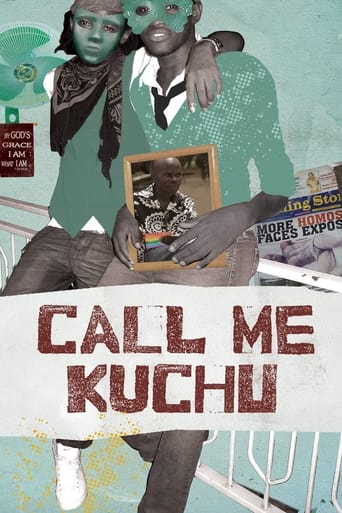AfroPixFlix
Moving beyond tears, and the shocking ending caught me by surprise. Empathy goes a long way, but this film shows that, empathy, like charity, must begin at home...along with compassion, tolerance, and fairness. Whether its fear, errant biblical application, or plain stupidity that motivates a nation to "out" suspected homosexuals, things need to change there in Uganda. Note the word "suspected," since some citizen's names and photos have been published in the Ugandan scandal-rag "Rolling Stone" and targeted for prosecution and murder. Of course, it's easy to pick on Uganda. The whole world is filled with intolerables and people who support them, but let's face it, you got to pt out the biggest fires first, and Uganda is a raging inferno. I realize that this film probably won't be seen by those who most need to see it, and if perchance they do, it'll just harden their stone quarry mid-sections. But AfroPixFlix says see this. Be aware.
bkoganbing
With the critical acclaim that God Loves Uganda has gotten with talk of an Oscar nomination for it, this film Call Me Kuchu has been somewhat eclipsed. That is a pity because it is a powerful look at the same issue from a different point of view.God Loves Uganda focuses on the outside help that American evangelicals are having in Africa with the passage of strict draconian type laws or the enforcement of those left by colonial powers. Call Me Kuchu is an examination of the suffering of the Ugandan LGBT community. The term 'Kuchu' is that derogatory term of gay people along the lines 'maricon' in Hispanic cultures and others in English speaking areas.There are some heartfelt testimonies of gay men and lesbians forced from home and hearth by prejudice stoked by the church. That's a universal story, but in Africa one has far less resources if one is LGBT to draw on than in the USA.One of the lesbians echoes something I've maintained for years that we owe this to colonialism. Uganda was a British colony and when the British quit they left all their Victorian era laws in place and the attitudes. They've moved on, but the tradition lives and is being fed and refined by rightwing fundamentalist evangelicals.David Kato figures prominently in this film. After being 'outed' in a Ugandan magazine ironically entitled Rolling Stone, he paid with his life in a brutal attack by home invaders which shocked the world. The movie was being filmed during the Kato homicide and the producers got footage they never bargained for with his funeral being interrupted by religious zealots. Kind of the Ugandan version of the Westboro Baptist Church.Bishop Christopher Senyonjo who should be getting as much acclaim as Bishop Desmond Tutu is also in the film and still very much in the fight for LGBT equality in Africa. Like Tutu he's in my consideration for a Nobel Peace Prize. Not every person who takes up the ministry of any faith has to be a homophobe.If you appreciated God Loves Uganda you will feel the same about Call Me Kuchu. And this review is dedicated to Kerry Kennedy, daughter of Robert F. Kennedy whom I met at a political fundraiser. She advised me about this film which she had come across in her own human rights work honoring her late father. Glad I took your advice and saw this.
Shuggy
I had vaguely remembered that a gay activist had been killed in Uganda, but didn't realise until the event in the movie that this man, David Kato, who I had been getting to know and empathising with, was the same one.But the movie does not dwell on his death, more on his life and struggle and that of those around him. His mother is a beautiful character.I don't know which was worse, the smug, jokey newspaper editor (it's cheekily called the "Rolling Stone") who took no responsibility for any of the hatred he was stirring up or its consequences, or the smug local church people, or the smug, arrogant American evangelist, bringing American-style bigotry to Uganda.The Anglican Bishop Christopher Senyonjo is a lovable respite from all this hatred, a Ugandan Desmond Tutu. The scenes at David's funeral, where he rescues the body from a local pastor who wanted to straighten out the LGBTI congregation, are very touching.And yet, it's the same religion both he and the bigots are in the thrall of, and equally drives them both to do good or evil, almost at random, underlining Christopher Hitchen's catchphrase that religion poisons everything, and Steven Weinberg's, that for good people to do evil, that takes religion.The courage of the local LGBTI people is amazing. We went through just a tiny fraction of that ordeal 26 years ago, and it seemed bad enough at the time. This movie and the dauntless people in it, packing up and moving on when their lives are endangered, and yet fronting up to courts, hostile crowds, policemen, clergy and thugs (sometimes the same people), will give heart to those who are still struggling.
arasbaskauskas
Call Me Kuchu is a beautiful documentary that explores the struggles of the LGBT community in Uganda, a country where homophobia is rampant and violence against homosexuals is all too common. CMK is a story of courage and love. In the face of mounting physical threats, a few Ugandan's are willing to stand up for what they believe in, even if it means harm. While the film centers around the rights of the LGBT community in Uganda, the story's underlying dynamics are packed with parables that can be applied almost anywhere. Call Me Kuchu will more then likely leave you with tears, so I'd recommend bringing tissue into the theater.

